Related Research Articles

The Islamic Republic of Pakistan maintains a large network of diplomatic relations across the world. Pakistan is the second largest Muslim-majority country in terms of population and is the only Muslim majority nation to have possession of nuclear weapons.

Foreign relations of Saudi Arabia are the diplomatic and trade relations between Saudi Arabia and other countries around the world. The foreign policy of Saudi Arabia is focused on co-operation with the oil-exporting Gulf States, the unity of the Arab world, Islamic solidarity, and support for the United Nations. In practice, the main concerns in recent years have been relations with the US, the Saudi Arabian–led intervention in Yemen, the Israeli–Palestinian conflict, Iraq, the perceived threat from the Islamic Republic of Iran, and the effect of oil pricing. Saudi Arabia contributes large amounts of development aid to Muslim countries. From 1986 to 2006, the country donated £49 billion in aid.
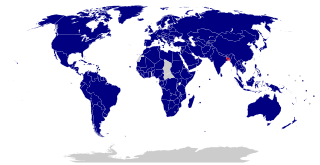
The foreign relations share the Bangladeshi government's policies in its external relations with the international community. The country pursues a moderate foreign policy that places heavy reliance on multinational diplomacy, especially at the United Nations and World Trade Organization (WTO). Since independence in 1971, the country has stressed its principle of "Friendship towards all, malice towards none" in dictating its diplomacy. As a member of the Non-Aligned Movement, Bangladesh has tended to not take sides with major powers. Since the end of the Cold War, the country has pursued better relations with regional neighbours.
The Prince Alwaleed Bin Talal Center for Muslim-Christian Understanding (ACMCU) is an interfaith institution based at the Georgetown University School of Foreign Service in Washington.
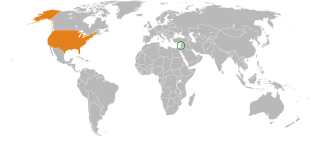
Lebanon–United States relations are the bilateral relations between Lebanon and the United States.
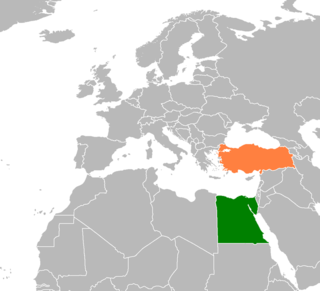
Egypt and Turkey are bound by strong religious, cultural and historical ties, but diplomatic ties between the two have remained extremely friendly at times and extremely strained at others. For three centuries, Egypt was part of the Ottoman Empire, whose capital was Istanbul in modern-day Turkey, despite governor of Egypt, Muhammad Ali, waged war against the Ottoman sultan, Mahmud II, in 1831.

India–Turkey relations, also called Indian-Turkish relations or Indo-Turkish relations are the bilateral relations between India and Turkey. Since the establishment of diplomatic relations between India and Turkey in 1948, political and bilateral relations have been usually characterised by warmth and cordiality, although some sporadic tensions remain due to Turkey's support for Pakistan, India's rival. India has an embassy in Ankara and a consulate–general in Istanbul. Turkey has an embassy in New Delhi and also a consulate-general in Mumbai. As of 2015, the bilateral trade between India and Turkey stood at US$6.26 billion.

Kosovo–Saudi Arabia relations are foreign relations between the Kosovo and Saudi Arabia. Like Saudi Arabia, Kosovo has a mainly Muslim population.

Israel–Maldives relations refer to foreign relations between Israel and the Maldives. The countries had diplomatic relations from 1965 to 1974. From 2012 to 2017, they maintained cooperation agreements, but did not restore full diplomatic relations.
The First Battle of Ürümqi was a conflict in the spring of 1933 between the armies of the Xinjiang provincial government under Jin Shuren and the Dungan New 36th Division of the Nationalist government of China. The Chinese government secretly urged Hui General Ma Zhongying to attack Jin Shuren while at the same time assuring Jin that he was recognized as the legitimate Governor. Fierce fighting broke out at the gates of the city, and one of the Chinese commanders torched a street where the Muslims troops had managed to break through at the West Gate, killing everyone in the vicinity, including refugees. The Dungans were then forced to retreat into the range of machine gun fire, which killed many of them.

Bosnia and Herzegovina–Denmark relations refers to the current and historical relations between Bosnia and Herzegovina and Denmark. Bosnia and Herzegovina has an embassy in Copenhagen, and Denmark has an embassy in Sarajevo. Diplomatic relations were established on 2 June 1992. In 2010, Danish Foreign Minister Lene Espersen announced that Denmark will close their embassy in Sarajevo in 2012.
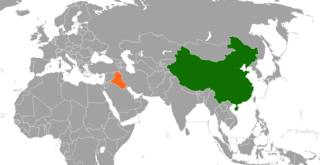
China–Iraq relations is the bilateral relationship between China and Iraq. Relations between both countries still remain very close and friendly. Iraq is a major destination for Chinese investment in the Middle East and China is the biggest buyer of Iraqi oil.
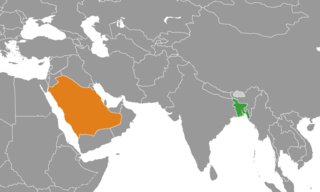
Bangladesh–Saudi Arabia relations are the diplomatic and bilateral relations between Bangladesh and Saudi Arabia. Relations between the two nations had a strained beginning but have grown strong since then. Being a Muslim-majority state, Bangladesh attaches a special importance to its ties with Saudi Arabia, which is the birthplace of Islam. Both nations are members of the Organisation of Islamic Cooperation (OIC) and Saudi Arabia hosts a large proportion of the global Bangladeshi diaspora.

Indonesia–Yemen relations are current and historical bilateral relations between Indonesia and Yemen. Indonesia and Yemen shared similarity as the Muslim majority countries, Indonesia is the most popular Muslim country in the world, while Yemen also a Muslim majority nation. Indonesia has an embassy in Sana'a, while Yemen has an embassy in Jakarta. Both the countries have many cultural proximities and similar view on international issues and these nations are members of the Non-Aligned Movement and Organisation of Islamic Cooperation (OIC).

Indonesia and Serbia established diplomatic relations in 1954, with the legal frameworks was inherited from the Yugoslavian era. Indonesia has an embassy in Belgrade and Serbia has an embassy in Jakarta. Both nations are the founders of Non Aligned Movement.
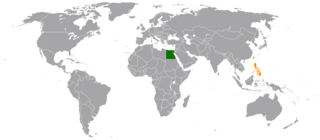
Egypt–Philippines relations refers to the bilateral relations between Egypt and the Philippines. Egypt has an embassy in Manila whilst the Philippines has an embassy in Cairo.

The relations between the Republic of Azerbaijan and the State of Palestine were established in 1992 with both nations recognizing each other. Palestine has an embassy in Baku, while Azerbaijan does not have an embassy in Palestine.
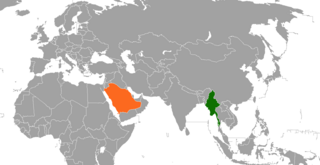
Myanmar–Saudi Arabia relations refer to the bilateral relations between Saudi Arabia and Myanmar. Myanmar has an embassy in Riyadh while Saudi Arabia has an embassy in Yangon.

Turkey–Yugoslavia relations were historical foreign relations between Turkey and now broken up Yugoslavia.
Algerian–Kosovar relations are foreign relations between Algeria and Kosovo.
References
- ↑ Doran, Michael Scott (2004). "The Saudi Paradox". Foreign Affairs. Council on Foreign Relations. 83 (1): 35–51. doi:10.2307/20033827. JSTOR 20033827.